Issue 106 : 5 June 2022
Talofa Lava, Kia Orana, Malo E Leilei, Tena Koutou, Hello ...
... and welcome to the latest issue of “For The Love Of The Game”, the official e-zine of the New Zealand Amateur Sport Association Inc., founded in Wellington, New Zealand in 2017.
If you have any feedback on this issue, ideas for future articles, or would like to contact the Editor, please click here. And, you are invited to forward the e-zine to others you know, who may be interested in reading it. An archive of earlier editions of the e-zine can be found here. For those who follow Twitter, you can also follow the Association, @AmateurSportNZ.
If you are interested in applying for membership of the Association, please click here.
Sport Otago Hosts Association Seminar ...
On 26 May, the Association joined with Sport Otago in presenting to community sport clubs at the Edgar Centre in Dunedin, on the new changes to sport club governance being introduced by the Incorporated Soceities Act 2022. Around 50 representatives of community sport organisations in the region were in attendance, with many concerned by the impact of the legislative change and what it would mean for their existing governance framework.
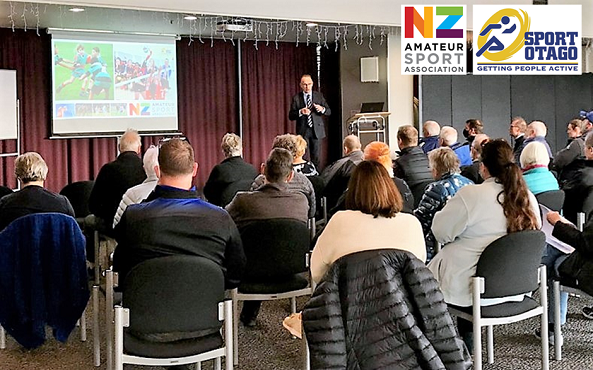
(There is growing interest in the impact of the Incorporated Societies Act 2022)
The presentation is one of a series that the Association is undertaking with Regional Sport Trusts nationally, to raise awareness of the changes community sport clubs will need to make in response to the new legislation. If you are interested in attending a presentation in your area to learn more about how the new Act will affect you, please click here.
New Association Award To Celebrate Matariki & Te Reo ...
In association with “Te Upoko o te Ika” (NZ’s first te reo radio station), the inaugural “Te Tohu Tiketike o Matariki” award will be presented by the Association on 24 June ("Matariki"), to acknowledge a community sport club which has embraced te reo Maori as part of its kaupapa.
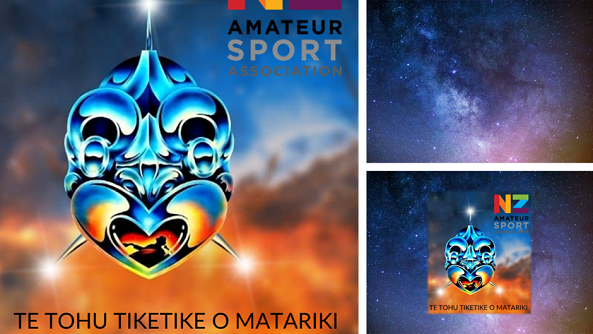
(Contact the Association to nominate a community club for the inaugural award)
For the benefit of overseas readers of this newsletter, "Matariki" (the Pleiades) signal the Māori New Year. For Māori, the appearance of Matariki heralds a time of remembrance, joy and peace. It is a time for communities to come together and celebrate. In the 2000s, it became more common for both Māori and Pākehā to celebrate Matariki. From 2022, a public holiday marking Matariki will be held in June or July each year.
Values Of Sport Can Help Prevent War ...
Speaking to a delegation of 100 members of the “Reale Circolo Canottieri Tevere Remo” (Royal Rowing Club Tevere Remo) on the occasion of the 150th anniversary of its foundation in April, Pope Francis remarked that the spirit of true sport is an important antidote to help prevent war. The Club's President, Daniele Masala, said that the Club's meeting with the Pope "should have been only of joy, [but] is veiled with apprehension for the war events in Ukraine."
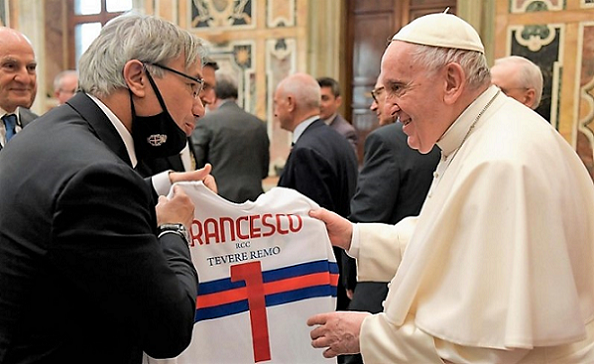
(The Ukraine war cast a shadow over Tevere Remo's sesquicentennial celebrations)
In response, Pope Francis noted that “the values of healthy competition, friendship and solidarity” are best expressed in amateur sport, noting that professional sport is more likely to be conditioned by “the logic of profit and of exasperated competition”, which can even lead to violence. You can read more, here.
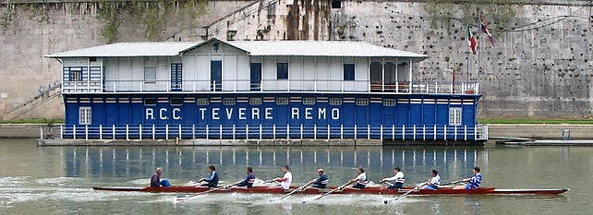
(The "Royal Rowing Club Tevere Remo" was founded in 1872)
Harbour Sport Seminar On Wednesday, 8 June ...
The Association will be presenting an update on the new Incorporated Societies Act at the "North Harbour Sports Leaders Forum", this week. The forum is targeting those in community sport leadership positions, including club chairs, board members, presidents, and general managers, all of whom will be affected by the new legislation.

If you are in the Auckland region and interested in attending this seminar (which will take place at Harbour Sport's offices in Albany), the registration details for the seminar can be found here.
Viewpoint: “The Merger” ...
In the opening scenes of the 2018 Australian movie “The Merger”, the grandson of the President of the failing “Bodgy Creek Roosters Football Club” (AFL) team asks “Goober” a member of the team, what “merger” means. Goober replies, “it’s [a merger] when one s*#@! team joins up with another s*#@! team, to make a slightly less s*#@! team!”
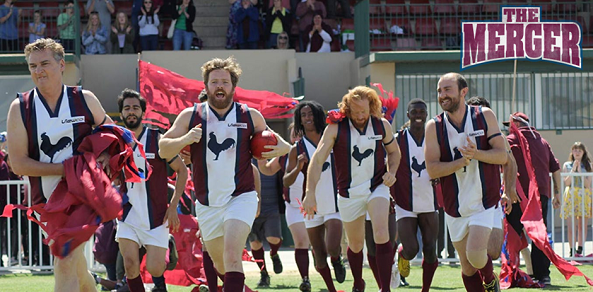
("The Merger" celebrates the unifying nature of sport in diverse communities)
The quote perhaps reveals a certain truth that from time to time underlies certain sport club amalgamations, however the movie reveals a greater truth about how community sport clubs serve as an important means of integrating people of diverse backgrounds into a community with a common purpose, interest and values.
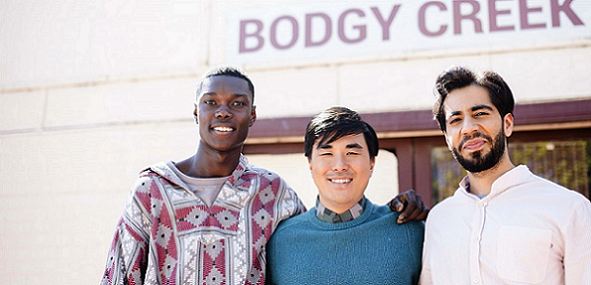
(The Bodgy Creek Roosters Football Club becomes a hub of community pride)
Akin to many fictional narratives in which the underdog ultimately prevails, the “Bodgy Creek Roosters Football Club” goes on to win the regional pennant, in a triumph of community spirit over adversity. The moral of this particular story is less around the financial equity required to keep the club afloat, but more around the social equity created through a celebration of community spirit. (“The Merger” can be viewed on Nefflix New Zealand).
Introducing Historical Medieval Battle New Zealand (HMBNZ) …
The Association’s newest "national sport organisation" member is Historical Medieval Battle New Zealand Inc. (HMBNZ). Last year, Sport NZ recognised “Historical Medieval Combat” as a sport category and listed HMBNZ as a National Sports Organisation, prompting the national body to apply for membership of the Association.
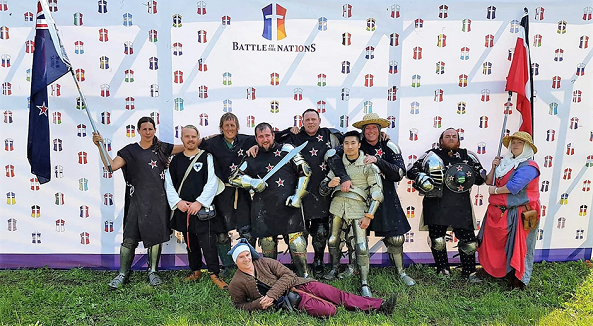
(The most recent HMBIA General Assembly had representatives from 36 countries)
A global amateur sport open to adults and youth, Historical Medieval Battle is a modern full-contact fighting sport using blunt steel weapons characteristic of the Middle Ages. Fighters wear full modern-produced protective armour, made from steel, (or other permitted metal alloy), that is as aesthetically close to their historical counterparts as possible.
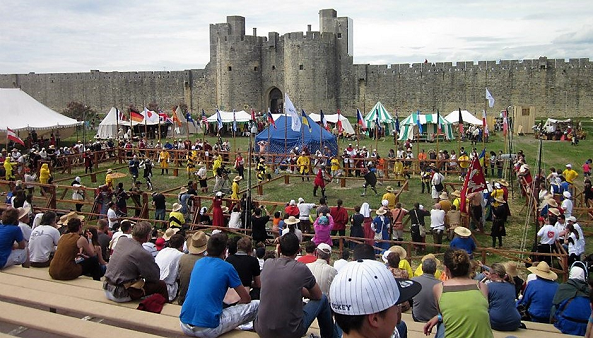
(The HMBIA was first registered in Liechtenstein in 2012)
HMBNZ selects, develops, and supports, the official New Zealand team (the “Steel Blacks”) to represent New Zealand at the "Battle of the Nations" World Championship in HMB and other official HMB International Association events, including the 2022 Trans Tasman "Buhurt Cup".
From The Archives …
OBSERVER, VOLUME XL, ISSUE 28, 13 MARCH 1920, PAGE 25
H. E. WILSON, THE NEW ZEALANDER
"The man from Maoriland has caught the regular American straight-leg style in hurdling. Wilson, however, is quite unique in his method, half jerk and half wriggle. He at the present time holds the title of the 120 yards hurdles champion of England, of the British Army, of New Zealand, and of Australasia, and he is also 440 yards hurdles champion of New Zealand.
At the Australasian championships he won his heat in the 120 yards hurdles in 16 sec. The final was cut out in 15.2 sec, and then it was considered that he was not at his best. Wilson is one of the neatest hurdlers seen in action. He jumps very cleanly, rarely ever touching a hurdle, and doubtless his claim for inclusion in the Olympic team will be very strong.”
Harry Ernest Wilson was born in Wellington in on 28 May 1896, the son of Thomas and Ann Maria Wilson. Harry had two sisters, Jennie Ethel (Booth) and Elsie Rita (Ordish). The family lived in their early life at Daniel Street in Newtown, then at 3 Palm Grove in Berhampore.
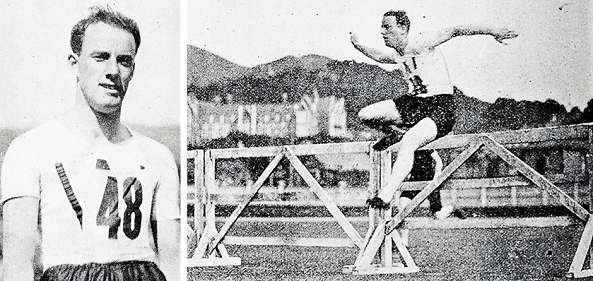
(Harry Wilson was a member of the Wellington Amateur Athletic Club)
While at secondary school at Wellington College, Harry developed a skill for high jump and hurdling, joining the Wellington Amateur Athletic Club. Following his schooling, in June 1915, Harry and his sister Jennie left New Zealand for England, were they both served in the armed forces, Harry as a gunner and Jennie as a nurse. In August 1918 at the New Zealand Infantry Base Depot sports in Etaples, France he won 6 events and was 3rd in the 7th.
In 1919, Harry was a member of the New Zealand team that competed in the Inter-Allied Games in Paris, and finished third in the 120 yards hurdles. Later that year, Wilson won the 120 yards hurdles at the British Army championship meeting at Aldershot and went on to win the British national championship over the same distance at Stamford Bridge, London.
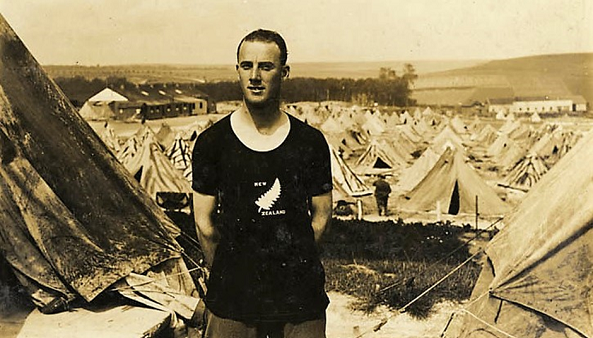
(Wilson was the British and New Zealand hurdles champion, post World War One)
At the 1920 Olympics in Antwerp, Belgium, Wilson achieved two thirds in the heats of the 110 yard hurdles, finishing fourth in the final. In December 1920, he returned to New Zealand, having married Sybil Hippsley, of Wolverton, Buckinghamshire, in England on the 20th of September of that year. The family made their home at 32 Cornwall Street in Island Bay.
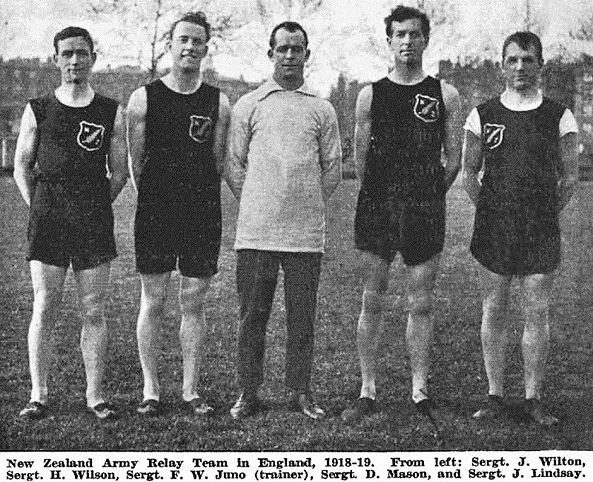
Harry continued with his athletics and in 1922 set the New Zealand record for the 120 yard hurdles in 15.1 secs. He participated in the Australasian championships in Hobart in 1924, however fell and fractured his patella in a heat for the 120 yard hurdles, which he was tipped to win. Bringing an end to his career as a competitive athlete, a benefit meeting was held for Harry at Athletic Park on March 22, 1924. He became a piano salesman and then a civil servant, leaving New Zealand for England in May 1938 where he gained employment as a "Dairy Sales Division Representative". In 1940, he volunteered for service in World War 2.
Harry Wilson died on 11 August 1979 in Surrey, England. He is remembered as “a sportsman through and through and for that … a figure in sport to be highly esteemed and admired.”
The Final Word …
“Sporting activity helps to establish good friendships and the building of a more serene and fraternal world, in which one supports and helps each other.”
(Pope Francis)